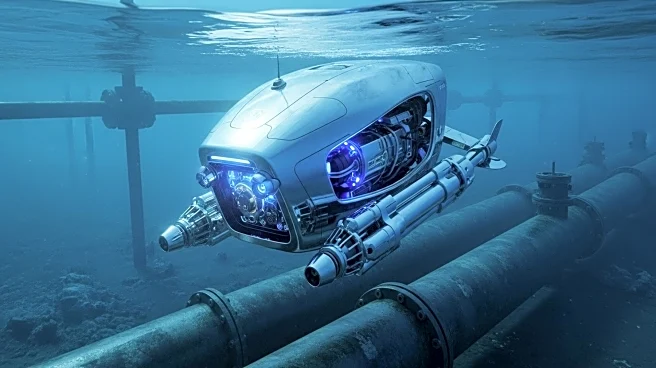What's Happening?
A Ukrainian national, identified as Volodymyr Z., has been arrested in Poland under a European arrest warrant issued by German prosecutors. He is suspected of involvement in the 2022 explosions that damaged the Nord Stream gas pipelines under the Baltic Sea. The arrest follows a lengthy investigation into the sabotage, which disrupted a key source of natural gas for Europe amid an energy crisis triggered by Russia's invasion of Ukraine. German authorities allege that Volodymyr Z. was part of a group that placed explosive devices on the pipelines, causing significant damage. The suspect's lawyer has stated that the extradition to Germany will be challenged, citing the ongoing war in Ukraine as a reason for the warrant's inadmissibility.
Why It's Important?
The arrest of Volodymyr Z. is significant as it marks a key development in the investigation into the Nord Stream pipeline sabotage, which has had substantial geopolitical and economic implications. The destruction of the pipelines reduced Europe's ability to access Russian natural gas, exacerbating the energy crisis and increasing tensions between Russia and Western nations. The case highlights the complex interplay between energy security and international relations, particularly in the context of the ongoing conflict in Ukraine. The outcome of the legal proceedings could impact diplomatic relations and energy policies in Europe.
What's Next?
The legal proceedings against Volodymyr Z. are expected to continue, with his lawyer challenging the extradition to Germany. The case may involve further investigations and legal arguments regarding the validity of the European arrest warrant. Additionally, the arrest could prompt reactions from various stakeholders, including political leaders and energy companies, as they assess the implications for energy security and international relations. The ongoing investigation by German authorities may lead to further arrests or revelations about the sabotage operation.
Beyond the Headlines
The arrest raises broader questions about the security of critical infrastructure and the potential for sabotage in geopolitical conflicts. It underscores the need for enhanced security measures and international cooperation to protect energy supplies and prevent similar incidents in the future. The case also highlights the ethical and legal challenges of prosecuting individuals involved in acts of sabotage during wartime, particularly when the targets are linked to adversarial nations.











